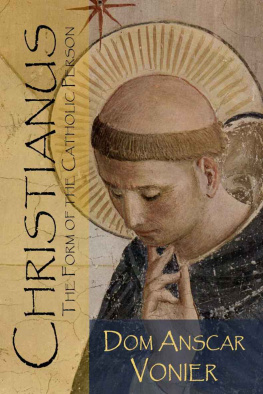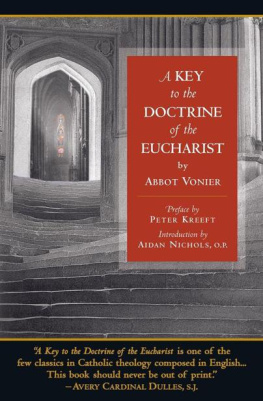THE LIFE OF THE
WORLD TO COME
BY
DOM ANSCAR VONIER, O.S.B.
ABBOT OF BUCKFAST

2013
Nihil Obstat.
Eduardus Mahoney, S.T.D., Censor Deputatus.
Imprimatur.
Edm. Can. Surmont, Vicarius Generalis.
Westminster
May 17, 1926.
The Nihil Obstat and Imprimatur are official declarations that a book or pamphlet is free of doctrinal or moral error. No implication is contained therein that those who have granted the Nihil Obstat and the Imprimatur agree with the content, opinions or statements expressed.
This book was originally published in 1926 by Benziger Brothers.
Copyright 2013 Assumption Press. All rights reserved
Cover image: The Vision of St. John the Evangelist, Unknown Artist, 15 th Century
Contents
Foreword
The essays which make the contents of this book have appeared at various times in the pages of our Abbey magazine, Chimes . Friends have asked me to gather them into book form; and I give them now as they first appeared. The reader must not expect a connected treatment of the doctrine of eternal life; yet most of the points known to Catholic theology in this matter of our eternal future are discussed with some freedom, I admit in the following pages. I may say, however, that the essay entitled The Resurrection of the Body is a careful and accurate study of that great mystery.
ANSCAR VONIER, O.S.B., Abbot of Buckfast.
BUCKFAST ABBEY, Feast of the Annunciation, 1926.
I
The Wealth of Our Hope
Every Sunday in the Creed we sing, as a final flourish, the words et vitam venturi saeculi (and the life of the world to come). In the musical setting of the great operatic Masses these last words of the Creed have indeed become something stupendous; melody is heaped upon melody, as if the composer could not leave the text, and ran back to it every time he had left it with a new and more ardent kiss than before.
The words merit such glorification; they express truly the mystery of eternal harmony; and no amount of melody here on earth will ever adequately render the depths of that great faith.
I await the life of the world to come, says the believer; he expects a new life in a new world. He knows enough about his present life and the world in which it is spent. He is very tired of them both the present life and the present world so he sits down; and when you ask him why he is thus sitting by the roadside, he tells you that he is waiting for something; he says in the Creed: expecto , I await, as he would expect or await somebody or something already on the road. He does not use the word spero , I hope, but expecto , I await, because the world to come, with its life, is on the road already, it is moving out of infinite distance, coming nearer every day, as stars and planets are said to be moving towards the earth from incalculable distances, yet with a surety and swiftness which make their coming into the horizon of our observation a matter of determined certainty.
The Christian is not only hopeful, then, of a better fate in some future existence, but he is more than that. Believing in all the articles of the Creed, and, of course, living up to them, he may indeed sit and await the chariot of God; it is sure to come his way; the world to come with its life will take him up as on a chariot of triumph. The chariot of God is attended by ten thousands; thousands of them that rejoice (Ps 67:18).
This, then, is the first profound thing, the first deep note of our theological thoughts; instead of saying that we hope to have eternal life, we are made to say that we await the life of the world to come. Hoping for something is profoundly different from awaiting something. You await a train; you hope for fine weather. A train is always sure to arrive; if you are early you sit down and feel the happiness of certainty. But if you are bent on pleasure your hope of a fine day has an element of disturbance; you are not quite, quite certain whether the fine weather will hold. Hope is a very different thing from expectation. There is in hope an element of uncertainty, a kind of struggle; we have to work ourselves up to it when we hope earnestly; expectation, waiting, is so easy; a child can do it; you never get fussy unless you fail in hope and begin to dread that after all the thing you want is not going to happen.
So, in the atmosphere of purely spiritual things, when we hope we do something more than to expect, to await something; we make an effort of the mind and heart; spes est boni ardui , hope strains for what is difficult, arduous. The difficult thing is this, to possess now the life of God in our frail, poor souls, so much inclined to the life of sin. Incredible as it seems, in spite of all appearances to the contrary, yet through hope we feel confident that Gods life is in us, that we are of the family of God, and that God comes out to us, down into our souls, to lift them up to Himself.
Hope has then for its object, not directly the life of the world to come, but the life of God in this world. We hope to lay hold on God through all the darkness of our mortal existence; we hope that through His grace we may never let Him go, that We shall persevere in His love to the very end, that death will find us alive in Him. This is why hope is called a theological virtue: it has God for its object; not God in the distant future; no virtues are ever of the future, they are ever of the present hour. In hope we throw ourselves forward now, with a mighty effort, so as to seize God in spite of that other constant tendency of our fallen souls to retreat from God. If hope were only of future things it would be something less than faith and charity, which are essentially our better life now, this very moment.
But this great conquest of God once achieved, this great difficulty of our own pusillanimity once overcome, with the supernatural certainty in our hearts that God will never abandon us we compose ourselves into peaceful expectation; we await the life of the world to come as a most natural sequel: We await it as we await the resurrection of the dead, for such is the double expectation of the Creed: et expecto resurrectionem mortuorum, et vitam venturi saeculi (and I expect the resurrection of the dead, and the life of the world to come.) It is clear that with regard to that great thing, the resurrection of the dead, we are merely in an attitude of expectancy; none of us can do anything to bring it about; it will come in the hour which the Father has not revealed to any creature. So with the life of the world to come. It is sure to come out of the treasury of Gods omnipotence; it is sure to take us up, to carry us on the bosom of its waves of glory, if we are found worthy, if God is in us through faith and hope and charity.
Sanctity is a very practical thing, not a distant dream. A saint is a great being wherever he is; he has achieved the greatest of all victories before the day of eternity dawns; he has found God through the might of his hope whilst his soul is yet in his body. The life of the world to come is a mere result of the more essential victory, to possess God. For that he can wait, for the possession of God he cannot wait; if he waited he would not be a saint. The great conquest is to possess God; hope is the forward lan of the soul that rushes the obstacles that fence round, not God indeed, but the soul itself. When once the obstacles are rushed, when once God is attained, the conquering hero may sit in his tent and await the hour when he will be told the number of prisoners and the amount of booty. It would not be a practical thing in spiritual life to make an effort to seize the life of the world to come: the world to come is still far away; but it is a most practical achievement for the soul to leap forward towards God, who is just on the other side of that trench which sin and worldliness have dug about the soul. There is a deep note of wisdom in the melody of the Credo when we sing expecto instead of spero the life of the world to come.
Next page




